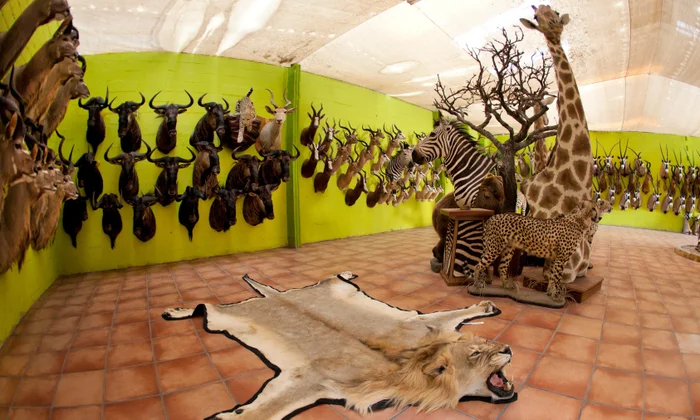KATHMANDU, June 24: Do you display animal parts such as bones, tusks, horns, or hides (trophies) in your home or office for prestige? If so, do you have the required permit? If not, beware—such practice is illegal. If you haven't obtained permission, the trophy must be surrendered, or legal action will follow.
The Supreme Court (SC) has issued a mandamus order to the government, instructing it to issue a public notice calling for the return of animal parts kept without approval in homes or offices. The joint bench of Justices Sapana Pradhan Malla and Til Prasad Shrestha made this ruling on Jestha 16, 2080 BS (30 May 2023), and the full text was made public on Friday. The verdict directs the government to collect trophies kept in violation of the law.
The “National Parks and Wildlife Conservation Act” was introduced in 2029 BS. In 2032 and 2035 BS, the then-government published notices in the national gazette urging the registration of all trophies kept at home. Since then, no one has come forward for registration.
If the item was kept before the law was introduced, the government may issue a permit after verification. The court has criticized the government for ignoring the matter for 50 years after issuing the notice. To date, the government has no record of what types or quantities of trophies are held by which individuals, families, or institutions in Nepal.
Wildlife conservationist Kumar Paudel had submitted a complaint—with evidence of a tiger hide displayed in the home of a prominent person in Kathmandu—to the Ministry of Forests and Environment and the Department of National Parks and Wildlife Conservation, demanding action. However, not only was there no action, the complaint was not even heard. Following that, Paudel filed a writ petition at the Supreme Court on 2 Jestha 2075 BS (16 May 2018). In his petition, he argued that while ordinary individuals have been imprisoned for possessing tiger claws, hides, or rhino horns, influential people have faced no action for displaying them at home.
DNPWC prepares to destroy seized wildlife trophies

In its mandamus, the SC stated that those who collect or display trophies as a symbol of pride or prestige should be brought under legal action.
Following this decision, the government must now immediately issue a public notice to implement the verdict. Anyone who voluntarily surrenders such trophies within the announced period will not be penalized. However, if they fail to do so, they will be subject to investigation and legal action. Items such as elephant tusks, tiger hides, and deer antlers are often displayed for prestige.
The court has also ordered the government to run awareness programs for the general public, especially in areas with national parks, about the harms of poaching and smuggling. The SC believes this will help curb the illegal export of wildlife parts. Trophies refer to identifiable parts—living or dead—of wildlife. This includes bones, fur, skin, etc. The law prohibits anyone from displaying trophies in homes, offices, or other locations as a sign of luxury or status without obtaining a permit.
The court ordered, "If any trophies are found in homes, offices, or other locations without a permit or license, the Nepal Government must publicly announce a deadline within which they must be submitted, stating that no action will be taken if they are voluntarily handed over within that period."
The court further stated, "If the trophy was inherited or has been used for religious or cultural purposes before the enactment of the law and this can be proven, then the process to obtain a permit should be allowed. If no evidence is provided, the trophy should be confiscated."
The verdict also mentions that any voluntarily submitted or confiscated trophies, as well as those registered through a permit process, must be tagged and recorded in a detailed inventory. Based on international practices and expert consultation, items should be either destroyed or preserved in museums or used for scientific research and studies, depending on their conservation status, uniqueness, and scientific relevance.
The government can decide whether to destroy or preserve trophies after registering them. The court discourages hunting, killing, collecting, or trading of animal trophies. "Regulating and destroying trophies will reduce demand and discourage both hunters and buyers," the court said, "It will also strengthen the country's commitment to wildlife conservation and the global stance against the exploitation of endangered species." Regulating trophies is expected to reduce the risk of them re-entering the illegal market through theft or corruption.
The court emphasized that the beauty of wildlife lies in their living form, and hence, displaying their parts should be discouraged. It stressed that the use and demand for trophies should be reduced. "To discourage the use of animal skins and parts for luxury and aesthetics, it is necessary to destroy such trophies."
According to the National Parks and Wildlife Conservation Act 2029 BS, keeping wildlife trophies without a permit is punishable by law. It is illegal to possess, purchase, sell, or transport such items without permission. Even if the item was acquired before the Act came into force, it must be registered through verification.
Trophies from endangered and vulnerable species are still found in homes and offices. Keeping or collecting trophies without a license is illegal. The court has also clarified how voluntary submission of trophies should take place. If the notice only warns of penalties, people might be scared to come forward and instead hide or destroy the items. Therefore, the court emphasized that no one will face action if they voluntarily surrender trophies.






































